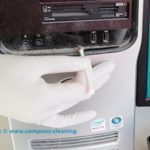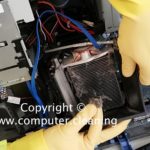Before discussing nuclear hazards, must know about radiation and radioactive materials. Radiation is a form of energy which is produced when the nucleus of an atom is broken apart called fission producing heat and radiation. Nuclear power plants use this heat to turn water into steam. Steam turns the turbine to produce electricity.
Any radiation and any radioactive materials produced during the fission process are considered waste products. Radiation emitted natural sources are known as “background radiation”, because it is present everywhere, all the time. Radioactive atoms are known as “radionuclides”.
Water acts as a natural barrier to radiation and can be used to isolate radioactive spent nuclear fuel at nuclear power plants. Nuclear hazards or risk and dangers are associated with each step of the nuclear “fuel cycle”
Nuclear “fuel cycle”
• Mining of uranium ore from the underground mines.
• The ore is then crushed (milled) into the sand and then concentrated using a solvent to produce “yellowcake”.
• It is then sent to a factory where it is turned into fuel “pellets” which are packed into rods.
• The rods are inserted in the core of a reactor, which undergoes nuclear reaction under controlled conditions to avoid the explosion.
• The reaction (fission) produces tremendous heat, which boils water to make steam, the steam turns a turbine to produce electricity.
Each step of the ‘fuel cycle’, (mining, processing, transportation, nuclear power and energy production) poses a potential threat or hazard which is dangerous for life on earth.
Apart from the heat, many new radioactive elements (Strontium-90 and Plutonium-239) are also produced. These are unwanted and dangerous by-products or “radioactive waste”.
Uranium ore and mill waste remain heaped in deserts because there is no place to store them. They blow around with wind and wash with rain giving out radioactive gas for thousands of years in future.
People are concerned about the safety of nuclear power plants that are currently operating. Radiations can be released from them and nuclear contamination can occur at other points in the nuclear fuel cycle. The recent accidents have had a great effect on people’s attitudes towards power plants safety.
Prevention and control
At both Chernobyl and Three Mile Island, it was operators error by the (human error) that caused the disastrous accident when operators manually stopped normal safety actions from taking place. Mechanical designing of the reactor should be such that the reactors should get shut down immediately under such conditions.
Many new designs do have such a shut-down mechanism to prevent such disasters.
A huge amount of heat is generated in nuclear power plants, only one-third of the heat is used in generating electricity and two third is lost as waste heat. To reduce the harmful effect of the waste heat, costly cooling facilities are constructed and operated. Nuclear power plants are often constructed close to a large water source like lakes, rivers, oceans from where large quantities of water can be drawn directly and returned after cooling process is over.
Related Topics:
Methods for Reducing, Recycling, and Reuse of Wastes
Safe Disposal of Nuclear Wastes
Life Cycle Analysis OR Life Cycle Assessment





